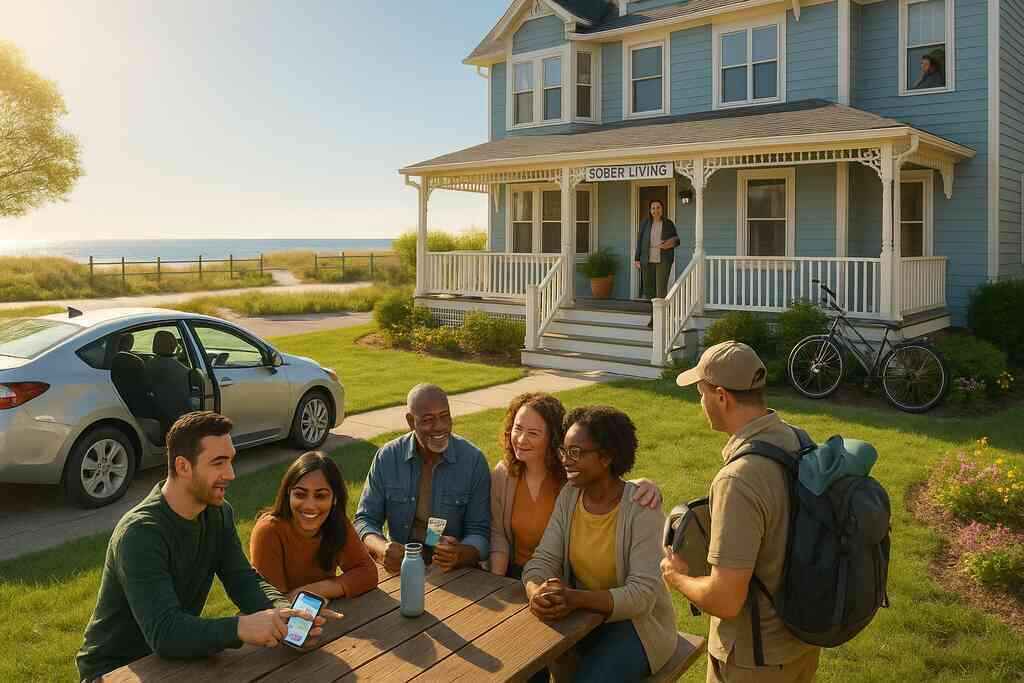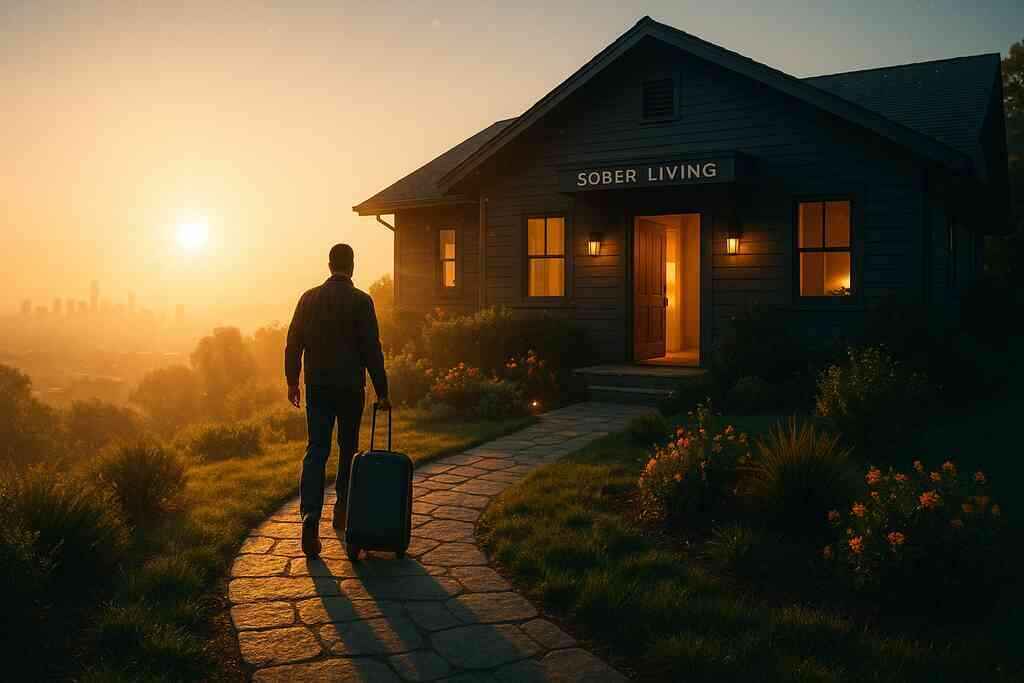
How to Leverage Sober Resources Near You in NJ 2025
November 27, 2025
Awakening the Garden State Recovery Wave 2025
Setting intentions for sustainable sobriety
Sustainable sobriety begins with a clear vision, and New Jersey residents are setting powerful intentions for 2025. Many individuals facing alcohol addiction or drug abuse realize that recovery must feel personal, pragmatic, and community-centered. By defining purposeful goals-such as attending weekly 12-step meetings or committing to a structured daily routine-people anchor their early recovery journey. A supportive environment, complete with house rules that encourage accountability, helps residents of sober living homes thrive. For statewide inspiration, many newcomers explore the top sober living network NJ 2025 to see real stories of hope.
Intentions alone, however, will not guarantee long-term sobriety; action must follow words. House managers often recommend newcomers write a one-year vision statement, revisiting it each month to track meaningful progress. Practicing mindfulness and faith-based routines empowers residents to remain present, grateful, and resilient. Trauma-informed support groups also help individuals rewrite narratives shaped by past pain. Together, these intentional habits build the groundwork for durable independence.
Mapping the New Jersey resource ecosystem
New Jersey’s sober landscape has expanded dramatically, creating an interconnected web of inpatient treatment centers, outpatient programs, and community-integrated group homes. Those seeking immediate placement can quickly find sober homes near me in New Jersey, comparing neighborhoods, pricing, and peer-support models in minutes. Beyond housing, the state hosts specialized 12-step meetings, bilingual recovery circles, and veteran-focused peer gatherings, all designed to address unique cultural and clinical needs. Local governments have also partnered with employers to build recovery-friendly workplaces, streamlining job placement pipelines for residents completing sober living programs. These overlapping services continuously reinforce each other, lowering relapse risk.
Behavioral health advocates emphasize the importance of integrating mental health services with substance use disorder treatment. Many facilities maintain direct referral lines to detox programs, therapists, and the statewide mental health centers directory in NJ. This seamless coordination ensures no one slips through the cracks during transitions. Additionally, tech-enabled sober transportation options allow residents to attend counseling appointments or support groups even in rural counties. By mapping every link in the care chain, Garden State providers are building a recovery ecosystem that feels truly holistic.
Harnessing Top Sober House NJ search tools
The Top Sober House Directory remains the most comprehensive tool for evaluating sober living houses in New Jersey 2025. Its intuitive filters are sorted by zip code, insurance acceptance, and specialized tracks such as LGBTQ+ affirmative or trauma-informed care. Users can also review house manager credentials, daily schedules, and resident testimonials before applying. For deeper guidance, newcomers often explore the navigate NJ sober strategies guide 2025 to learn best practices for admission and funding. These digital resources compress what once required days of phone calls into a single afternoon.
Innovation does not stop at search; Top Sober House continues to spotlight breakthroughs in peer-driven housing. Quarterly reports highlight advancements in medication-assisted treatment integration, eco-friendly facility upgrades, and culturally competent programming. Readers can explore trend analyses, such as the innovation trends in NJ sober houses, to stay informed and proactive. With this knowledge, residents and loved ones can make data-driven choices, thereby maximizing the likelihood of long-term sobriety. Ultimately, technology and compassionate expertise combine to turn possibilities into realities across the Garden State.
Navigating Policy Currents and House Rules in Modern Halfway Homes
Decoding NJ halfway houses regulations
New Jersey revamped its halfway house statutes in 2024, and every resident should grasp the updated safeguards. Licensing now falls under the Division of Mental Health and Addiction Services, which enforces clear staffing ratios. Facilities must document house rules in writing and review them with incoming residents before any admission fee changes. Random inspections verify sober living environment compliance, including medication storage and emergency exits. These measures reflect the core principles outlined in the modern halfway house rules and help protect vulnerable individuals.
Municipal ordinances sometimes appear restrictive, yet federal disability law overrides discriminatory zoning that targets sober housing. Therefore, a sober house near you can operate in residential zones when it respects noise and occupancy limits. A savvy house manager maintains open dialogue with city officials, preventing misunderstandings before they disrupt community relations. Residents also review neighborhood etiquette guidelines during orientation, reinforcing goodwill toward neighbors who might still misunderstand addiction recovery. Knowledge of statewide and local codes empowers individuals to advocate confidently, protecting their sober living houses from unfair challenges.
Understanding house manager leadership models
Effective halfway houses rely on skilled leaders who balance empathy with firm boundaries. New Jersey certification courses now teach motivational interviewing, crisis de-escalation, and documentation ethics to every prospective house manager. Graduates learn to run morning check-ins, supervise random drug screens, and enforce chore rotations without shaming residents. They also master digital reporting tools that relay occupancy and relapse data directly to clinical partners for seamless care coordination. Ultimately, strong leadership transforms group homes into thriving peer support incubators.
Even veteran managers continue growing through monthly supervision circles facilitated by addiction counselors and policy experts. During these meetings, leaders dissect case studies highlighting the critical peer support role in New Jersey recovery. They share practical scripts for mediating roommate conflicts, celebrating milestones, and redirecting negative thinking before it becomes hazardous. Because every resident arrives with unique trauma histories, continuous training remains essential to preserve a supportive sober environment. Consequently, top sober houses invest in leadership scholarships, ensuring no promising manager stalls due to financial limitations.
Creating trauma informed and culturally competent safe environments
Modern sober living in New Jersey must feel welcoming to every identity, language, and faith tradition. Trauma-informed design begins with soft lighting, private reflection spaces, and staff trained to recognize common PTSD triggers. Daily routines incorporate grounding exercises and mindfulness techniques that calm the nervous system before house meetings. Moreover, bilingual peer mentors provide translation during intakes, allowing Spanish-speaking residents to grasp house rules completely. Such inclusive practices turn top sober homes into bridges between marginalized communities and high-quality substance use disorder services.
Culture goes beyond language; it also covers gender identity, veteran status, and religious convictions. Hence, many Garden State operators now offer LGBTQ affirmative bedrooms, women-only trauma tracks, and veteran support cohorts. Residents design personal safety plans, outlining boundary preferences and emergency contacts that staff post discreetly on file. Top sober houses near you may even coordinate with chaplains or rabbis to honor faith-based healing pathways. For guidance on inclusive programming, managers review the detailed checklist within the leverage top sober house support NJ resource hub.
Insurance friendly admission pathways
Financial uncertainty often delays treatment, yet New Jersey has broadened insurance mandates to cover sober living programs. Under the 2023 parity law, commercial plans must reimburse certified recovery residences when recommended by licensed clinicians. Medicaid expansion additionally funds room, board, and case management for qualifying clients in halfway houses. Consequently, families can pursue long-term sobriety without liquidating college savings or retirement accounts. Smart consumers still compare deductibles, preauthorization rules, and length-of-stay caps before signing any financial consent forms.
House admission teams simplify the paperwork by verifying benefits in real time and emailing itemized cost projections within hours. They also liaise with outpatient program coordinators to synchronize therapy schedules and transportation vouchers. If coverage gaps appear, staff connect applicants with county grants or private scholarships reserved for sober homes. Prospective residents who lack insurance entirely can still thrive by choosing sliding-scale payment plans negotiated during intake. To explore personalized funding strategies, individuals simply contact top sober house experts and receive confidential guidance the same day.

Integrating Peer-Driven Support and Tech Enabled Coaching
Building a 12-step and beyond hybrid routine
The twelve-step tradition remains a cornerstone, yet modern residents crave variety that reinforces every learning style. House managers now weave the classic Alcoholics Anonymous steps with cognitive-behavioral worksheets and weekly trauma circles, forming a hybrid routine that feels fresh. Morning reflections review each step’s spiritual principle, while afternoon workshops translate that lesson into SMART goals. By night, residents attend neighborhood AA or NA meetings, then debrief as a group to cement insights. This layered schedule keeps early recovery engaging, structured, and deeply personal.
Top sober houses across New Jersey encourage residents to experiment with complementary modalities instead of abandoning the twelve-step recovery framework altogether. Yoga, dialectical behavior therapy homework, and gratitude journaling become electives that residents can swap as their needs evolve. That flexibility nurtures autonomy, a critical ingredient for long-term sobriety. When people craft their own balanced curriculum, they internalize recovery rather than merely comply with it. Over time, the hybrid model transforms daily routine into an instinctive lifestyle.
Leveraging recovery apps and sober transportation options
Smartphones have become pocket coaches, thanks to vetted apps that track cravings, schedule meditations, and ping sponsors instantly. House managers preload devices with sobriety counters, mood journals, and geo-fencing alerts that discourage bar proximity. Residents then review app data during weekly one-on-ones, turning numbers into actionable strategies. The real-time feedback prevents minor slips from ballooning into relapse.
Transportation hurdles once kept people from outpatient program appointments, but ride-share credits now bridge that gap. Many group homes partner with recovery-friendly drivers who pass additional background checks and carry Narcan. A push notification confirms pickup, easing anxiety for residents who still mistrust public transit. These combined tech tools forge a supportive environment that extends far beyond the house’s front door.
Rutgers collegiate recovery and community networks
New Jersey’s flagship university operates one of the nation’s most comprehensive collegiate recovery programs, and sober homes frequently coordinate with it. Rutgers offers academic advising, sober social events, and on-campus 12-step meetings that welcome non-students. House managers often escort residents to open seminars on addiction science, where professors translate neurobiology into practical relapse-prevention tactics. Exposure to evidence-based knowledge boosts confidence and demystifies cravings.
Beyond the campus, alumni volunteers mentor residents through scholarship applications, résumé clinics, and internship referrals. This academic pipeline embodies the Garden State recovery journey: from early vulnerability to durable independence. Collaboration also reduces stigma, proving that sober living in New Jersey 2025 can intersect with higher education and professional ambition seamlessly.
Mindfulness centered and faith based synergy
Meditation cushions now sit beside devotional texts in the common areas of top sober houses near you, illustrating a deliberate blend of science and spirituality. Morning mindfulness sessions train residents to observe thoughts without judgment, lowering stress hormones before chore assignments begin. In parallel, optional prayer groups and scripture studies meet after dinner for those who draw strength from faith traditions. Neither path dominates; both coexist, creating a safe environment for diverse beliefs.
Clinical studies show that combining contemplative practice with spiritual fellowship multiplies resilience. Residents who adopt both tools report fewer cravings and greater life satisfaction at the six-month mark. House managers model inclusivity by attending at least one secular and one faith-based session weekly, reinforcing that all healing languages are welcome. This synergy teaches that recovery need not be a binary choice between science and devotion.
LGBTQ affirmative and veteran focused peer circles
Identity-specific peer circles ensure that every resident feels seen, protected, and celebrated. Weekly LGBTQ meetings address minority stress, navigating dating apps sober, and advocating for affirming healthcare. Veteran cohorts process combat memories, explore service-related guilt, and connect with VA benefits specialists. By isolating shared experiences, these circles accelerate trust, allowing deeper emotional work than mixed groups sometimes permit.
Many facilitators map residents to the most compatible cohort using the directory of “sober living houses in New Jersey 2025” and its detailed house profiles. Knowing which top sober houses already employ queer staff or veteran peer mentors prevents painful trial and error. Inside the homes, customized house rules-such as pronoun affirmation protocols or quiet hours for PTSD symptoms-foster a genuinely inclusive atmosphere. Participants often describe these tailored meetings as the first time they have felt fully understood since entering sobriety.
From Early Recovery to Durable Independence
Job placement pipelines and recovery friendly workplaces in NJ
Landing meaningful work stabilizes early recovery while reinforcing long-term sobriety. New Jersey employers increasingly adopt recovery-friendly hiring policies that respect treatment schedules and random testing requirements. House managers at top sober houses partner with local workforce boards to align interviews with residents’ daily routine. These pipelines funnel graduates from inpatient treatment into apprenticeships in construction, culinary arts, and health care. Employers receive state tax incentives for maintaining sober environments, motivating them to mentor employees battling substance use disorder. Residents of sober living homes gain confidence as paychecks replace financial chaos created by alcohol addiction. This synergy transforms group homes into launchpads instead of lingering stopovers.
Career coaches inside many sober living programs run résumé workshops every Wednesday evening. They help residents translate 12-step leadership roles into marketable soft skills. Alumni volunteers from top sober house networks share success stories, proving second chances yield loyal employees. Companies that thrive on teamwork especially value the peer support ethos learned during recovery. Job seekers who need specialized credentials can access grants outlined by the nationwide addiction treatment services clearinghouse. Financial assistance covers driver’s licenses, coding bootcamps, and union dues, eliminating relapse triggers tied to money stress. By integrating employment milestones into personalized recovery plans, house rules remain motivating rather than restrictive.
Outpatient programs and sober coaching continuity
Sustained progress demands seamless transitions between residential treatment center discharge and community-based care. Top sober homes in New Jersey insist residents enroll in an accredited outpatient program within days. Weekly therapy, medication management, and group psychoeducation sessions extend the supportive environment beyond house walls. Because schedules vary, house managers coordinate transportation and curfews, ensuring clinical appointments never conflict with twelve-step meetings. Residents also review the find AA meetings schedule in the NJ calendar to reinforce evening accountability. This layered care model reduces rehospitalization rates while nurturing autonomy. Over time, people internalize relapse-prevention techniques instead of relying solely on external supervision.
Not every resident feels immediately aligned with Alcoholics Anonymous, and choice matters. House managers therefore encourage newcomers to locate NA meetings across Garden State when opioid addiction dominates their history. Mixing modalities keeps engagement high and prevents complacency, a common precursor to alcohol abuse relapse. Certified sober coaches monitor attendance through digital check-ins, offering real-time feedback on mood trends. This tech-enabled loop allows early interventions whenever craving intensity spikes. Embedding accountability into daily routines turns the sober living environment into a safe place for testing new coping skills.
Community integrated sober living networks along the Jersey Shore
The Jersey Shore’s tight-knit towns foster natural peer support through boardwalk cleanups, beach yoga, and seasonal jobs. The top sober house near you often collaborates with coastal churches to host barbecue meetings that welcome families. Local police departments attend these gatherings, reinforcing that sober housing benefits neighborhood safety. An active service culture helps residents replace alcohol addiction rituals with community stewardship. For those commuting to inland jobs, transit passes link group homes to regional rail, maintaining employment stability. Cross-state collaboration emerges naturally; visitors from Pennsylvania sober residences nearby often join Jersey Shore bonfire meetings.
Summer tourism can trigger temptation, so house rules include early curfews during holiday weekends. Residents rotate as “sober ambassadors,” advising vacationers about non-alcoholic nightlife along the boardwalk. These leadership opportunities solidify recovery identity while strengthening local partnerships with civic groups. When storms threaten, networked sober homes share generators and food, illustrating mutual aid beyond program walls. Coordinators also swap vacancy information with the Delaware halfway and sober houses list to ensure safe transfers during emergencies. Such resilience planning underscores why Jersey Shore sober living houses rank among the top sober homes nationally.
Sustainable long term sobriety strategies and relapse prevention
Durable independence grows from disciplined habits anchored in evidence and tradition. Clinicians encourage residents to study the twelve-step recovery framework alongside cognitive behavioral relapse plans. By blending spiritual surrender with neuroscience, individuals gain a dual lens on cravings. Daily gratitude lists, morning meditation, and evening inventory reports form a protective ritual cycle. House managers measure progress through urine screens, mood scales, and peer evaluations rather than gut feelings alone. Residents soon recognize that self-monitoring does not threaten freedom; it amplifies personal agency.
Alumni often translate their victories into service by starting or upgrading sober homes. The Top Sober House directory invites graduates to list their NJ sober house for 2025 and share proven house rules. Publishing transparent standards holds operators accountable and inspires newcomers seeking a safe environment. Continuous quality improvement emerges as former residents return to teach workshops on financial literacy and nutrition. Through this circular mentorship, the recovery journey evolves into an intergenerational movement rather than a solitary sprint.
Charting Your 2025 New Jersey Sobriety Odyssey
Crafting a personal action map with Top Sober Houses
Your New Jersey sobriety odyssey requires more than enthusiasm; it demands a deliberate, written action map. Begin by outlining recovery priorities, such as attending 12-step meetings or mastering new coping techniques each week. List the strengths already present in your sober environment, including supportive roommates, clear house rules, and a vigilant house manager. Next, note potential stressors like late working hours or family tension, then brainstorm practical safeguards. This reflective exercise turns vague hopes for long-term sobriety into measurable, empowering objectives.
Use the Top Sober House directory to cross-reference goals with actual programs, filtering for sober homes that match your lifestyle timetable. For example, commuters might prefer properties near rail lines, while parents appreciate curfews aligned with school pickups. Comparing New Jersey listings with nearby sober living options in New York state reveals creative scheduling ideas you can adopt locally. After choosing a top sober house near you, schedule weekly calendar alerts labeled “action steps” and pair them with accountability check-ins. This digital framework keeps early recovery structured yet flexible, letting progress grow organically.
Measuring milestones and celebrating growth
Once your roadmap exists, measuring milestones becomes a motivating ritual rather than a clinical obligation. Many sober living houses employ color-coded progress charts that track therapy attendance, negative toxicology screens, and daily routine completion. Residents review these dashboards every Sunday evening, translating raw numbers into tangible narratives of healing. House managers then provide constructive feedback that highlights both skill mastery and upcoming challenges. Consistent measurement transforms the supportive environment into an interactive classroom where growth never goes unnoticed.
Celebrations maintain momentum when metrics plateau or stress surges. Top sober homes schedule monthly “gratitude dinners” where residents share victories like securing employment or completing inpatient treatment homework. Tokens, certificates, and small gift cards reinforce dopamine pathways without risking alcohol abuse triggers. Family members are invited virtually, ensuring loved ones witness the transformation and offer continued encouragement. These ceremonies remind everyone that recovery is not merely survival; it is a flourishing lifestyle.
Giving back to strengthen the Garden State recovery journey
Graduate residents quickly discover that service work cements the lessons learned in halfway houses and group homes. Mentoring newcomers at twelve-step meetings, volunteering during community cleanups, and co-hosting support groups all deepen empathy. By teaching relapse-prevention skills to others, alumni simultaneously refresh their own coping toolbox. This reciprocal peer support reduces isolation, a leading indicator of substance use disorder relapse. Furthermore, visible alumni involvement boosts neighborhood confidence in local sober housing initiatives.
Alumni eager to formalize their impact collaborate with advocates to draft fair zoning guidelines. These policies shield sober living houses from discriminatory ordinances and misinformed community pushback. Volunteers cite research, such as the understanding sober living houses article, when educating council members. Others partner with Top Sober Houses to present webinars that showcase effective house manager strategies. Each service action expands the Garden State recovery wave and safeguards resources for future residents.
Frequently Asked Questions
Question: How can Top Sober House NJ help me quickly find a supportive sober environment that also matches my insurance coverage?
Answer: The Top Sober House directory was built for speed and precision. Simply enter your ZIP code and select the insurance-friendly filter to see a live list of top sober houses, halfway houses, and group homes that accept Medicaid, commercial plans, or self-pay sliding scales. Each listing shows house rules, daily routine highlights, and whether medication-assisted treatment is available. Because every property is pre-screened for a safe place and a substance-free sober living environment, you can compare options in minutes instead of days of phone calls. Our Garden State recovery journey map even flags Jersey Shore sober homes, culturally competent sober living programs, and trauma-informed care pathways so you spend less time searching and more time healing.
Question: What makes the peer-driven sober housing at Top Sober House ideal for veterans, LGBTQ+ individuals, and bilingual families seeking alcohol addiction help in NJ?
Answer: Every top sober house NJ listing details its identity-specific supports. Veteran-focused sober resources include peer mentors who understand combat stress, quiet hours for PTSD symptoms, and direct VA benefit liaisons. LGBTQ affirmative recovery programs highlight pronoun affirmation policies, gender-inclusive bedrooms, and nearby queer-friendly 12-step meetings. Homes with bilingual sober support services note which staff speak Spanish or other languages and whether meetings have live translation. Because we require each property to post its cultural-competency training certificates, families can trust that their loved ones will enter a truly supportive sober environment-not just a generic bed.
Question: The blog How to Leverage Sober Resources Near You in NJ 2025 talks about tech-enabled recovery apps and sober transportation options-does Top Sober House integrate these features into its listings?
Answer: Yes. Our New Jersey sober living 2025 filter tags every residence that provides smartphones pre-loaded with craving-tracking apps, mindfulness-centered sober coaching software, and geo-fencing alerts. Listings also state whether the house partners with ride-share firms that specialize in sober transportation options-drivers carry Narcan and respect curfews. If you prefer public transit, the map view shows rail and bus stops within a 0.5-mile radius. These tech add-ons create an always-on supportive environment that extends far beyond the front door, reinforcing sustainable long-term sobriety strategies day and night.
Question: How does Top Sober House guide residents and families through NJ halfway houses regulations and house manager training requirements so they know their rights?
Answer: Navigating updated NJ halfway houses regulations can feel overwhelming, so every Top Sober House profile links to a compliance dashboard that confirms current licensing status, staffing ratios, and emergency-exit certifications. We also publish plain-language explainers on federal disability protections that shield sober housing from discriminatory zoning. For extra peace of mind, the site spotlights house manager training programs in motivational interviewing, crisis de-escalation, and documentation ethics. When you choose a property through our platform, you know the leadership team is equipped to enforce house rules with empathy and to maintain a truly safe place for early recovery.
Question: Can Top Sober House connect me to job placement pipelines and recovery-friendly workplaces in NJ 2025 after I complete an outpatient program?
Answer: Absolutely. Many residents of sober living homes worry about employment, so our directory flags properties that partner with workforce boards, union apprenticeship programs, and recovery-friendly employers. Once you move in, house managers help translate 12-step leadership roles into résumé language, schedule mock interviews, and align your therapy timetable with work shifts. Because employers receive state incentives to hire from certified sober living houses, Top Sober House users often secure positions in construction, culinary arts, tech, and healthcare within weeks. This employment support turns peer-driven sober housing into a launchpad for durable independence, completing the loop from early recovery to long-term sobriety.



